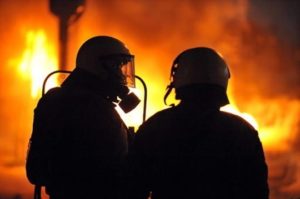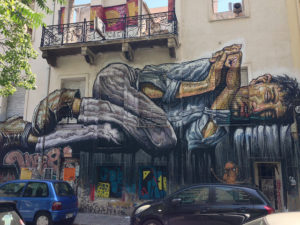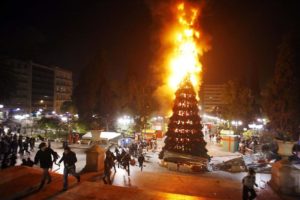Image by Nikolas Giakoumidis
Ten years ago, as of today, I happened to be on a parallel street from where the shooting took place. I was sitting on the front steps of a building in Exarcheia, chatting with one of my anarchist friends.
Exarcheia is the hub of Greece’s radical political and intellectual activism, where many protests (and riots) take place. Located in downtown Athens, the neighborhood is home to anarchist and anti-fascist groups, refugee squats, and to an underground art and music scene. As you walk along Exarcheia’s narrow streets, you’ll observe political graffiti and you’ll occasionally come across artwork – often criticizing capitalism – painted on gray buildings. You’ll also hear metal music booming from one of the many bars and clubs, and you’ll sometimes smell burning trash or tear gas.
Image by Dimitris Kamaras
I frequented in Exarcheia during my years as an undergraduate student at the Political Science department of the University of Athens, which was only a few blocks away from Exarcheia. I also hanged out in the neighborhood due to my love for metal music and general leftist political views. In some ways, I identified with anarchists, but not entirely. I never really liked labels anyway and always just considered myself as someone who questions the system.
My friend and I heard the shooting, but we were in the middle of an intense conversation and shrugged it off in the moment, thinking that a car had backfired. Perhaps an hour or so went by. We only really started to wonder what was happening when we heard angry voices shouting from not too far away. We approached the Exarcheia square and came across a large group of people, shouting in distress.
A 15-year-old boy, Alexis Grigoropoulos, had just been shot and murdered by the police, they told us. News of this quickly spread across Exarcheia, and many people swarmed to the square to start a protest against the shooting, against police brutality. My friend and I were horrified to hear of the murder and without hesitation, we joined the group to protest.
What started off as a peaceful – but very emotional – protest, quickly escalated into a riot. At some point, as were were walking down the narrow streets of Exarcheia, chanting slogans against police brutality, the street was blocked by the Units for the Reinstatement of Order (known in Greece as “MAT”), a special police division responsible for riot control.
I’m not sure how the riot started or who started it (the police or the protesters), as it all happened so quickly. Before I knew it, the streets were flooded with tear gas, Molotov cocktails were exploding around us, and rocks were flying above our heads.
It was terrifying.
The tear gas, thrown in huge volumes by the police, was overwhelming. It created such thick clouds of smoke, that you could barely see anything or breathe. I remember the burning feeling in my eyes. I remember the toxic taste of tear gas. I remember wearing my scarf around my face, gasping for air. It was late at night and dark. Within the darkness and the thick, suffocating clouds of tear gas smoke, the only light you could distinguish was the fire from burning cars and explosions.
The tear gas smoke was so thick that I could barely see my own hands. I could barely see the person next to me. You could hear the sound of rocks and other objects smashing around you, not knowing where they’re coming from. The streets were so narrow that it felt like there was no escape from it all. I covered my head with my one hand, trying to protect it from flying rocks, while using my other hand to cover my face with my scarf, gasping for oxygen. At some point, I realized that I had lost my friend.
As I searched for him within the thick clouds of tear gas smoke, I stumbled into several men with bleeding heads. The longer I searched, the more I started to panic. What if my friend had been injured too? What if he had been arrested? Merely being there in that moment (even if you hadn’t actually participated in the rioting or attacked the police), was probably enough to get you arrested. Being aware of this did not help one bit. I continued to plow through the smoke, desperately searching for my friend. I don’t know how long I searched – my perception of time was very different in those moments – but I didn’t manage to find him. As the police ran in my direction, I followed a group of people running in the opposite direction. I eventually found myself outside of one of Exarcheia’s metal music clubs, and I ran inside, thinking that it would probably offer a safe space. That’s where I found my friend. He too had lost me and eventually ended up at the same place.
By the next day, the police murder of 15-year-old Alexis was all over the news. It was no longer a matter of anarchists in Exarcheia being mad, as so was much of the rest of Greece. At around noon on Sunday, 7th December 2008, thousands of Greeks gathered in downtown Athens to protest against police brutality. I joined the demonstration.
It started off as a peaceful, but angry, demonstration. It was probably the largest and most diverse (in terms of population) demonstration I have ever seen in Athens. While students probably made up the majority, there were many pensioners and families with young kids as well. It therefore seemed that it probably wouldn’t escalate the way it did during the previous night, I thought.
As we walked down Athens’ central, large streets, the demonstration created the illusion of peace for a while. It was only when we entered the narrow streets of Exarcheia that the demonstration turned into chaos. In response to the previous night, the MAT units of the police had come prepared this time. Perhaps too prepared. Seemingly hundreds of police men were blocking the demonstration route. I was quite far back, squashed in between thousands of demonstrators, and hadn’t realized that the demonstration was going to soon descend into a riot. I only realized this when thousands of people started running in the opposite direction, almost creating a stampede.
Before I knew it, thousands of people were running in all sorts of directions, screaming and shouting. Unlike the previous night, this time I could see the flying rocks in the air crystal clear. I could also very clearly see that it was hard to escape the rocks, particularly while being crammed in between thousands of protesters in narrow streets. Some screaming people were even saying that, apparently, the fascists had broken into a medieval store and stolen some swords. I don’t know if this actually happened, but this was one of many bizarre things said by panicked demonstrators in those moments.
Within the scope of broad daylight, you could clearly see the extent of this riot’s chaos and havoc. Numerous parked cars and garbage bins were set on fire. Rioters were throwing rocks, smashing banks and stores. Groups of people were lurking around the rioters, looting stores after they had been smashed. It was surreal to see the flames burning the city to the ground, tear gas and Molotov explosions everywhere, while some people were running with looted shoes and other items in their arms.
I frantically covered my head (to protect it from flying rocks) and ran as fast as I could, following the masses. We were only a few streets away from my University building, and so we ran into it. Hundreds of men were already occupying the University by that point. It seemed like they were treating it as a type of fortress to fight the police from. This was possible at the time, when Greek Universities still offered asylum and the police was prohibited from entering (Greek Universities no longer offer asylum).
I was surprised by how organized and dis-organized everyone was in the University. Hundreds of young men had already gathered in one of the largest auditoriums, where the leaders of the Anarchist Movement were giving talks. Simultaneously, there was chaos, as the University had transformed into a sort of battleground. The police had surrounded the University building, and several rioters were throwing rocks at them from the external stairs of the 6th floor. At some point, they ran out of rocks, and they started breaking anything they could find to throw at the police: the stairs and even the bathroom sinks, almost creating a flood.
In light of the University asylum, the police couldn’t enter the University, but that didn’t stop them from throwing tear gas into the (small) front courtyard of the building. After hours of throwing tear gas, the smoke really became unbearable. It entered the building and quickly made its way up to the top floors. At that point, people were discussing how they could get enough books to burn to create a large fire that would absorb the gas. On the one hand, the tear gas was becoming extremely unbearable and it kind of made sense to go to more extreme lengths to deal with it. On the other hand though, the idea of burning books (!) did not seem ideal either, to say the least.
I tried to think of alternative solutions, but before I knew it, hundreds of books (and other items) were forming a big fire in the University courtyard, absorbing the tear gas. A library right opposite the University also caught fire, but I don’t really know the story behind that.
It was getting really late, and I realized that I was basically stuck in my University building, along with hundreds of demonstrators and rioters. Since the University building was completely surrounded by police, walking out did not seem to be an option. What would I tell them? Would they believe me that (while I was angry over the murder of the 15-year-old, and about police and state corruption overall) I was actually peaceful? That I hadn’t actively participated in the riots? Given that many other protesters had already been arrested, it seemed that I probably wouldn’t have had a different fate, if I had just walked out.
I was curious to understand the situation as best as I could. I spoke to multiple men in the occupied University, asking them why they felt the need to riot, what their motivations were, what they hoped to achieve.
Most of them were angry and provided very emotional responses. They hated the police, they hated the government, they hated the system. Background-wise, many of them were undergraduate University students and unemployed. The few that had jobs described working 12-hour shifts for less than 5 euros per hour. And the fact that they were enrolled in Universities didn’t give them much hope either. Many of them felt that having a University degree was a basic requirement for eventually getting a low-paid job that they would hate (and this seemed to be a good outcome, given the lack of opportunities in the country). They expressed frustration towards the political system and the ways that it marginalized its youth. They felt that the entire Greek political system was broken, that they had been marginalized for too long, and that the time had come for a backlash.
I also spoke with members of the Anarchist Movement. Given that they seemed to be a bit more strategical, leading the occupation of the University, I assumed that they would have more elaborate answers in relation to their motivations and plans. Instead, they merely told me that their main motivation was to overthrow the government. If the government is overthrown, I asked, what then? What would the next steps be? They had no answer. It was unclear to me if they hadn’t thought of this, if they didn’t care, or if they did have plans/ideas that they didn’t want to share.
This left me confused. Were we experiencing a political movement, motivated by ideals and plans for a better future? Or were we merely experiencing a political reaction to the current system? A bit of both, or something completely different?
I finally managed to leave the University building when an emergency occurred. One of my friends, who was in another occupied University building not too far away, called me frantically to say that her boyfriend’s head was hemorrhaging. When the riots escalated around that University, a large rock landed on his head and opened it up. There were no medical supplies though in her University, and so she called me to see if I or others could help.
At that point it was late at night, the riots around my University building had calmed down, and the police men were chatting with each other. I grabbed this opportunity to sneak out from the backdoor and to leave the University premises. One of my friends lived in Exarcheia, and so I visited his apartment to see if he had any medical supplies that I could bring to my other friend. He gave me a bunch of bandages and as I walked out, I wondered how I would enter the (other) University at all, given that it was surrounded by police as well. Luckily though, my friend called me to say that they had managed to leave the University, and that they were on their way to the hospital.
The riots lasted for weeks. Universities were occupied until 31st December 2008. Everyday there were intense demonstrations and riots all over Athens, up until mid-January 2009. It was surreal to see the Christmas tree on Syntagma square (the most central square of Athens) burn to the ground.
Image by Aris Messinis
It was also surreal to see hundreds of drama students lying on the floor outside of the Parliament, covered in red paint (symbolizing blood). I haven’t found any photos of that though.
The 2008 Greek riots have been characterized as “the worst Greece has seen since the restoration of democracy in 1974”. I wasn’t alive back in 1974, but it definitely felt that way. Athens “burned to the ground”. But it wasn’t just Athens – many demonstrations and riots erupted in numerous other Greek cities (and even in other countries) as well during that month.
At the time, the 2008 riots seemed like a response to a financial crisis that was also being experienced by the rest of the world anyway. But in fact, the story here was more complicated. The riots erupted right at the beginning of Greece’s severe, decade-long economic crisis. In a way, they served as a type of warning of what was to come. They briefly exposed the deep scars that had already been created, following decades of corruption and exploitation. In a way, the riots served as the publics cry for help.
Riots shouldn’t be brushed off as “chaos created by anarchists” – which is largely how they’ve been portrayed by the Greek media. Instead, we need to consider riots as warning signals of larger problems. We need to listen to the rioters, we need to listen to the marginalized, and we need to try to understand why they are angry. The main reason why they are being violent to begin with is because we didn’t listen to them before. History has shown (globally) that it’s a common pattern, that the marginalized often become violent in an (extreme and desperate) attempt to make their voices heard.
During the 2008 Greek riots, the burning cars, the burning buildings, the Molotov cocktails, the rocks and the shattered banks and stores reflected public angst. Anger, sadness, and frustration at The System which has ignored and failed its citizens. The tear gas resembled The System’s response, which was that of toxicity and hostility. But it was precisely this response that fueled the riots to begin with, and which will continue to do so as long as systemic issues go unaddressed.
Unfortunately, long-term, systemic problems are difficult to solve over night (especially without great leadership). This was evident by Greece’s decade-long economic crisis that followed, with more riots erupting over the years. All of these riots have been symptoms of Greece’s long-term, economic and political crisis.
Another symptom is the increasing political polarization. Greece now has a leftist government (Syriza), but radical-right groups have also emerged to power. The fascist Golden Dawn is currently represented in the Parliament, even though they are being trialled over the murder of an anti-fascist rapper and other criminal activities.
Ten years after the 2008 riots, Greece remains politically (and economically) fragile. I’m not sure if my generation is capable of building a culture of listening, a culture of open and respectful dialogue, a culture of democratic change. Perhaps that requires more time. Or perhaps now the time is ripe. I, still, honestly don’t know.



